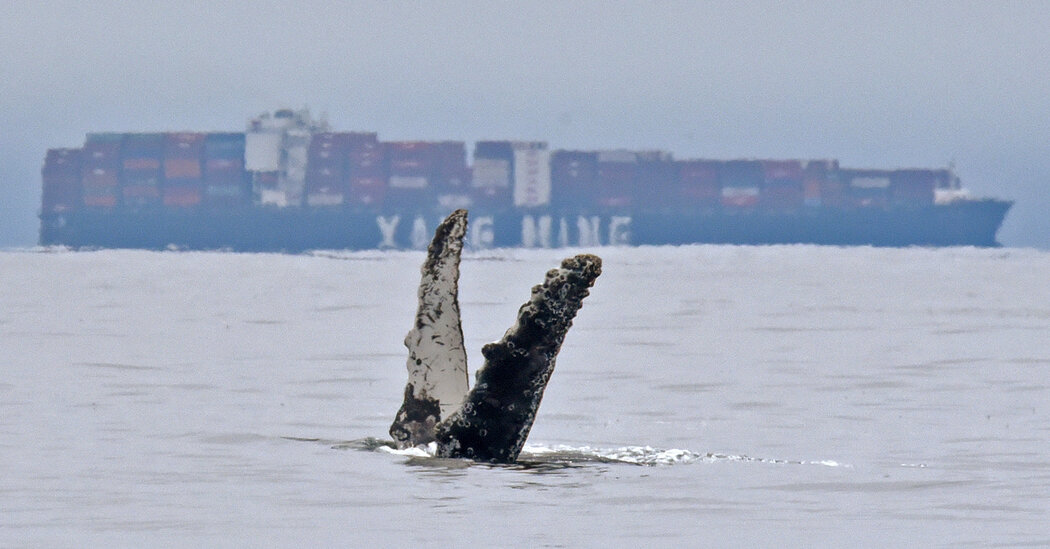Every year, in the waters off the California coast, hundreds of tankers, car carriers and container vessels from dozens of shipping companies take part in an unusual race.
To win, ships have to go slow.
Awards are given to companies whose fleets voluntarily reduce speeds in marine areas where endangered whales migrate through and feed in. The prize, known as Protecting Blue Whales and Blue Skies, comes with a sculptural whale-tail trophy and bragging rights.
“It’s good for the environment, and we make sure the public knows about it,” said Sean Hastings, a resource protection coordinator at the National Oceanic and Atmospheric Administration and a founder of the award program, which was created by a coalition of national marine sanctuaries, air quality districts and other nonprofit groups. “That’s the motivation right there.”
The real winner may be ocean life.
Program administrators say that the 2023 season, had the most participants ever — 33 companies. Eighty one percent of the total distance their ships traveled through the reduction zones was at the recommended speed of 10 knots or less, and that reduced the risk of fatal ship strikes to whales during the year by 58 percent. Slower ships also generate less ocean noise and fewer greenhouse gases and other air pollution.
“It’s like drivers slowing down in a school zone in the presence of schoolchildren,” Mr. Hastings said. “Every animal counts.”
About 90 percent of all consumer goods are shipped by sea, and the volume of maritime cargo has exploded in recent years, causing vessels to increase in size and numbers. The resulting traffic, pollution and underwater din have proven disastrous for marine life. Along the West Coast, an estimated 80 endangered blue, fin and humpback whales are killed by ship strikes annually, as warming waters caused by climate change shift their food sources closer to shore, where they can collide with ships.
As part of an effort to protect the critically endangered North Atlantic right whale, there are speed limits along the East Coast, and in recent years NOAA has hit violators with stiff fines. But reducing ship speeds off the California coast remains voluntary, partly because its endangered whale populations number in the thousands, whereas researchers estimate that there are fewer than 360 North Atlantic right whales left.
Protecting Blue Whales and Blue Skies started as a trial in 2014 to encourage shipping companies using the Santa Barbara Channel to slow down. Seven shipping companies signed on, slowing their vessels from between 14 knots and 18 knots to 12 knots, or roughly 14 miles an hour. The companies were offered $2,500 for each slowed trip.
More companies joined, and the monetary incentives increased. As the program’s popularity grew, the speed reduction zones were expanded to cover a larger stretch of the Southern California coast as well as waters along San Francisco and Monterey Bay, and the target maximum speed was reduced to 10 knots.
Tiered awards were also rolled out, a purposeful tactic. “We are not a shaming program,” Mr. Hastings said.
The top-level Sapphire prize goes to companies whose ships slow down for at least 85 percent of the total distance traveled through slow zones. Gold awards require a minimum compliance rate of 60 percent, and come with a plaque. Third place is the Blue Sky level, for companies whose ships go slow at least 35 percent of the time.
Only the Sapphire winners get whale-tail trophies, and in 2023 the cash incentives were scrapped, which one shipping manager said was just fine.
“We prefer more recognition, and I think people like the ceremonies,” said Jack Duesler, West Coast regional operations manager for NYK Line, a major shipping company based in Japan. NYK has reached Sapphire status for three of the past four seasons, to the delight of Mr. Duesler’s bosses, who he said really like winning the whale tails.
“You go to corporate, and all of a sudden people thousands of miles away are saying ‘I should get one of those,’” Mr. Duesler said.
Last season, 13 of the 33 participating shipping companies won Sapphire prizes, among them Yang Ming Marine Transport Corporation, based in Taiwan. Its chairman, Cheng Cheng-mount, said in an interview that the company took pride in landing a top spot.
“Every year we check the ranking — it’s important to us,” Mr. Cheng said. “Not many companies could have won this award.”
Mr. Hastings said that while the shipping companies in the program include many of the biggest shippers, roughly another 100 companies could join the program.
The ships’ travel data is supplied by the Benioff Ocean Science Laboratory, which also runs a tracking program called Whale Safe. This spring, it unveiled a real-time tool showing which shipping companies operating in North American waters are abiding by speed limits. It also grades companies from A+ down to F.
Rachel Rhodes, a project scientist at the laboratory, said that the detailed reports had compelled several poorly graded companies to improve their scores.
“People are starting to prioritize this,” she said. “No one wants to hit a whale.”
